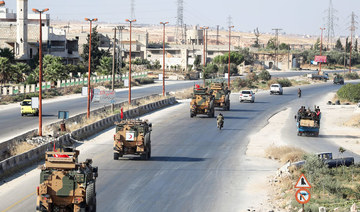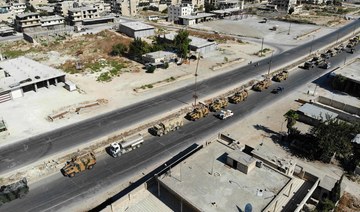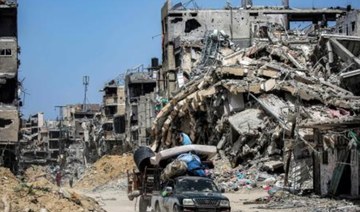BEIRUT: Syrian government forces surrounded a Turkish observation post in the northwest Friday after overrunning nearby areas, sparking anger from Ankara which vowed not to leave its outpost.
Speaking at a news conference in the Lebanese capital, Turkey’s Foreign Minister Mevlut Cavusoglu said “our observation point there is not cut-off and nobody can isolate our forces and our soldiers.”
“We are there, not because we can’t leave but because we don’t want to leave,” he said, adding that the issue was being discussed with Damascus allies Russia and Iran.
The Syrian regime has upped the stakes with Turkey in its months-long Russian-backed offensive against the extremist-ruled Idlib region.
Moscow said on Friday that it has agreed with Ankara to “activate mutual efforts” to ease the situation in Syria’s last major opposition bastion.
The town of Morek, where the Turkish troops have been cut off, lies in the north of Hama province, part of the region centered on neighboring Idlib province that has been under government assault since late April.
Government forces took control of Morek and nearby towns including Kafr Zita on Friday, Syrian state news agency SANA said.
Extremists and allied rebels withdrew from the area ahead of the army’s entry into the strategic town of Khan Sheikhun on Wednesday and government forces took control without resistance, according to the Syrian Observatory for Human Rights.
“Regime forces have surrounded the Turkish observation post in Morek after capturing other towns and villages in this pocket,” said the Britain-based monitor.
The Morek observation post, established under a deal with Moscow, is one of 12 the Turkish army set up along the front line between Syrian government forces on one side — and the extremists and Ankara’s rebel allies on the other side — last year.
On Tuesday Cavusoglu vowed that the Turkish army “will do whatever is necessary” to defend these positions.
The Turkish presidency has also said that it will not abandon any of its observation posts in Syria.
The Turkish troops’ mission was to oversee the establishment of a buffer zone agreed by Ankara and Moscow in September.
But the extremists failed to pull back from the zone as agreed and in April, government and Russian forces resumed intense bombardment of the region.
The Kremlin on Friday said that Russian President Vladimir Putin and his Turkish counterpart Recep Tayyip Erdogan agreed to “activate mutual efforts” to ease the situation in the Idlib region.
“They discussed the issues of Russian-Turkish cooperation in the context of stabilization of the de-escalation zone,” a statement said.
Erdogan is to host his Russian and Iranian counterparts for a summit in Ankara next month to discuss the latest developments.
The Turkish presidency on Friday said regime attacks in Idlib have led to a “grave humanitarian crisis.”
“These attacks damage the efforts to regulate the Syrian conflict,” it said.
The pro-government Al-Watan newspaper on Friday said the latest regime gains in Idlib will force amendments to the buffer zone deal.
Since January, the Idlib region has been ruled by the Hayat Tahrir Al-Sham alliance, which is led by extremists from Syria’s former Al-Qaeda affiliate.
Other rebel groups allied with Turkey were forced to cede overall control.
On August 8, Syrian government forces launched a ground offensive with Russian support against the southern part of the rebel-held region, eyeing control of the main highway from Damascus through Idlib province to second city Aleppo.
Khan Sheikhun and Maarat Al-Numan both lie along the highway.
The Syrian army on Friday said that its military “push is ongoing,” after it captured Morek and neighboring areas.
“Armed terrorist groups have lost the ability to stop our army’s heroes” it said.
Damascus said Thursday it will open a corridor for civilians to leave the area.
But most civilians had already fled before the pocket was cut off, according to the Observatory.
Since the end of April, more than 400,000 people have fled their homes, particularly in the south of Idlib and north Hama, the United Nations says.
Around 900 civilians have been killed, according to the Observatory.
Following a string of victories against extremists and other rebel groups, Assad’s government now controls around 60 percent of Syrian territory.
The war in Syria has killed more than 370,000 people since it started with the brutal suppression of anti-government protests in 2011.
Syria regime forces surround Turkish army post
Syria regime forces surround Turkish army post
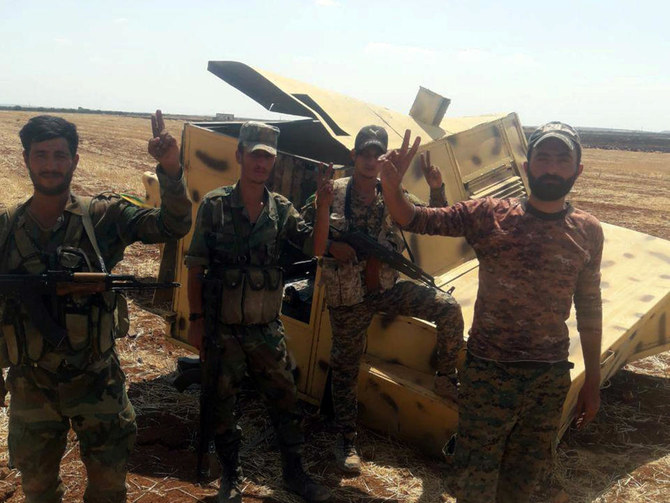
- The town of Morek, where the Turkish troops have been cut off, lies in Hama province, part of the region centered on neighboring Idlib province that has been under government assault
- Extremists and allied rebels withdrew ahead of the army’s entry into the strategic town of Khan Sheikhun on Wednesday and government forces took control without resistance
UN denounces ‘more serious’ Iran crackdown on women without veils

- Hundreds of businesses including restaurants and cafes have been shut down for not enforcing the hijab rule
- More women began refusing the veil in the wake of the 2022 death in custody of 22-year-old Mahsa Amini
The UN Human Rights Office also expressed alarm about a draft bill on “Supporting the Family by Promoting the Culture of Chastity and Hijab,” which would impose tougher sentences on women appearing in public without the hijab.
“What we have seen, what we’re hearing is, in the past months, that the authorities, whether they be plainclothes police or policemen in uniform, are increasingly enforcing the hijab bill,” Jeremy Laurence, a spokesman for the office, said at a press conference.
“There have been reports of widespread arrests and harassment of women and girls — many between the ages of 15 and 17,” he said.
Iranian police announced in mid-April reinforced checks on hijab use, saying the law was increasingly being flouted.
Hundreds of businesses including restaurants and cafes have been shut down for not enforcing the hijab rule, and surveillance cameras are being used to identify women without it, Laurence said.
More women began refusing the veil in the wake of the 2022 death in custody of 22-year-old Mahsa Amini after her arrest by Iran’s morality police for allegedly breaking the headscarf law, which sparked a wave of deadly protests against the government.
Laurence said that on April 21, “the Tehran head of the Islamic Revolutionary Guard Corps announced the creation of a new body to enforce existing mandatory hijab laws, adding that guard members have been trained to do so ‘in a more serious manner’ in public spaces.”
And while the latest draft of the new hijab bill has not been released, “an earlier version stipulates that those found guilty of violating the mandatory dress code could face up to 10 years’ imprisonment, flogging, and fines,” he said, adding that “this bill must be shelved.”
The Human Rights Office also called for the release of a rapper sentenced to death for supporting nationwide protests sparked by Amini’s death.
Toomaj Salehi, 33, was arrested in October 2022 for publicly backing the uprising.
“All individuals imprisoned for exercising their freedom of opinion and expression, including artistic expression, must be released,” Laurence said.
UN seeks to deescalate Sudan tensions amid reports of possible attack

- UN Secretary-General Antonio Guterres’ envoy is engaging with all parties to deescalate tensions
UNITED NATIONS: The United Nations is increasingly concerned about escalating tensions in Al-Fashir in Sudan’s North Dafur region amid reports that the Rapid Support Forces are encircling the city, signaling a possible imminent attack, the UN’s spokesperson said on Friday.
UN Secretary-General Antonio Guterres’ envoy is engaging with all parties to deescalate tensions in the area, the spokesperson said.
Israeli army says missile fire kills civilian near Lebanon

- The violence has fueled fears of all-out conflict between Iran-backed Hezbollah and Israel
- “Overnight, terrorists fired anti-tank missiles toward the area of Har Dov in northern Israel,” the Israeli army said
JERUSALEM: The Israeli army said Friday a civilian was killed near the country’s northern border with Lebanon, as near-daily exchanges of fire with Hezbollah rage.
Both sides have stepped up attacks this week, with Hezbollah increasing rocket fire and Israel saying it had carried out “offensive action” across southern Lebanon.
The violence has fueled fears of all-out conflict between Iran-backed Hezbollah and Israel, which last went to war in 2006.
“Overnight, terrorists fired anti-tank missiles toward the area of Har Dov in northern Israel,” the Israeli army said, referring to the disputed Shebaa Farms district.
“As a result, an Israeli civilian doing infrastructure work was injured and he was later pronounced dead.”
Israeli media reported that the victim was an Arab-Israeli truck driver. Police told AFP they had not identified the body, but said it was the only one found after a truck was hit.
Hezbollah said it had destroyed two Israeli vehicles in the Kfarshuba hills overnight in a “complex ambush” on a convoy using missiles and artillery.
The Israeli army did not comment directly on the claim.
It said Israeli fighter jets struck Hezbollah targets around Shebaa village in southern Lebanon including a weapons store and a launcher, while soldiers “fired to remove a threat in the area.”
It said fighter jets also “struck Hezbollah operational infrastructure in the area of Kfarshuba and a military compound in the area of Ain El Tineh in southern Lebanon.”
Lebanon’s official National News Agency reported that Shebaa village, Kfarshuba and Helta were targeted by “more than 150 Israeli shells,” leaving homes damaged.
Iran-backed Hezbollah has been trading almost-daily fire with the Israeli army since the day after its Palestinian ally Hamas carried out an unprecedented attack on Israel on October 7.
Since October 8 at least 380 people have been killed in Lebanon, including 252 Hezbollah fighters and dozens of civilians, according to an AFP tally.
Israel says 11 soldiers and nine civilians have been killed on its side of the border.
Tens of thousands of people have been displaced on both sides.
EU commits $73 million more for Gaza aid

- New EU aid would be focused on food deliveries, clean water, sanitation and shelters
- The EU and United States have demanded that Israel allows more aid into Gaza
BRUSSELS: The European Union on Friday said it was giving an extra 68 million euros ($73 million) to provide desperately needed aid to Palestinians in Gaza.
The territory has been devastated by more than six months of Israeli bombardment and ground operations after Hamas’s October 7 attack, leaving the civilian population of two million people in need of humanitarian assistance to survive.
“In light of the continued deterioration of the severe humanitarian crisis in Gaza, and the steady rise of needs on the ground, the (European) Commission is stepping up its funding to support Palestinians affected by the ongoing war,” an EU statement said.
“This support brings total EU humanitarian assistance to 193 million euros for Palestinians in need inside Gaza and across the region in 2024.”
The EU said the new aid would be focused on food deliveries, clean water, sanitation and shelters, and would be channelled through local partners on the ground.
The United Nations has said Israel’s operation has turned Gaza into a “humanitarian hellscape,” amid fears of a looming famine.
The EU and United States have demanded that Israel allows more aid into Gaza.
The US military said on Thursday it had begun construction of a pier meant to boost deliveries to the territory.
The war in Gaza began with an unprecedented Hamas attack on Israel on October 7 that resulted in the deaths of about 1,170 people in Israel, according to an AFP tally of Israeli official figures.
Israel vowed to destroy Hamas, with a retaliatory offensive that has killed at least 34,356 people in Gaza, mostly women and children, according to the Hamas-run territory’s health ministry.
Egypt sending ceasefire delegation to Israel
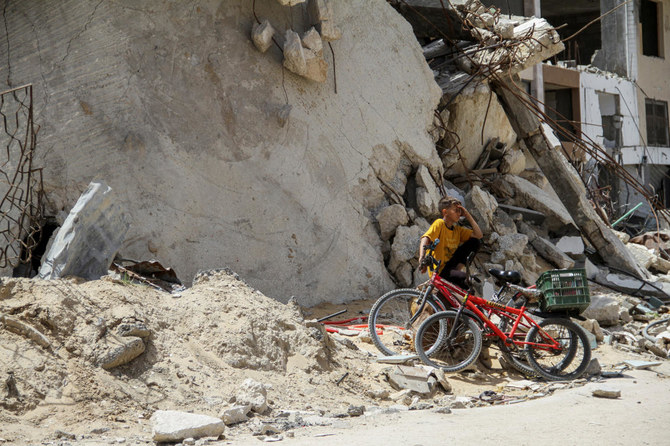
- Egyptian intelligence chief Abbas Kamel plans to make clear that Egypt ‘will not tolerate’ Israel’s deployments of troops along Gaza’s borders with Egypt
Egypt is sending a high-level delegation to Israel in the hope of reaching a ceasefire agreement with Hamas in Gaza, while warning a possible new Israeli offensive focused on the southern city of Rafah on the border with Egypt could have catastrophic consequences for regional stability, two officials said Friday.
While in Israel, Egyptian intelligence chief Abbas Kamel plans to make clear that Egypt “will not tolerate” Israel’s deployments of troops along Gaza’s borders with Egypt, an Egyptian official said, speaking on condition of anonymity to freely discuss the mission.
Earlier Friday, Lebanon’s militant Hezbollah group fired anti-tank missiles and artillery shells at an Israeli military convoy in a disputed area along the border, killing an Israeli civilian, the group and Israel’s military.
Hezbollah said that its fighters ambushed the convoy shortly before midnight Thursday, destroying two vehicles. The Israeli military said the ambush wounded an Israeli civilian doing infrastructure work, and that he later died of his wounds.
Low-intensity fighting along the Israel-Lebanon border has repeatedly threatened to boil over as Israel has targeted senior Hezbollah militants in recent months.
Tens of thousands of people have been displaced on both sides of the border. On the Israeli side, the cross-border fighting has killed 10 civilians and 12 soldiers, while in Lebanon, more than 350 people have been killed, including 50 civilians and 271 Hezbollah members.
On Thursday, Palestinian hospital officials said Israeli airstrikes on the southern city of Rafah in the Gaza Strip killed at least five people.
More than half of the territory’s population of 2.3 million have sought refuge in Rafah, where Israel has conducted near-daily raids as it prepares for an offensive in the city. The Israeli military has massed dozens of tanks and armored vehicles in the area in what appears to be preparations for an invasion of Rafah.
In central Gaza, four people were killed in Israeli tank shelling.
A ship traveling in the Gulf of Aden came under attack Thursday, officials said, the latest assault likely carried out by Yemen’s Houthi rebels over the Israel-Hamas war.
Meanwhile, a top Hamas political official said that the Islamic militant group is willing to agree to a truce of five years or more with Israel.
The Israel-Hamas war was sparked by the unprecedented Oct. 7 raid into southern Israel in which militants killed around 1,200 people, mostly civilians, and abducted around 250 hostages. Israel says the militants are still holding around 100 hostages and the remains of more than 30 others.
The war has killed more than 34,000 Palestinians, according to local health officials, around two-thirds of them children and women.



